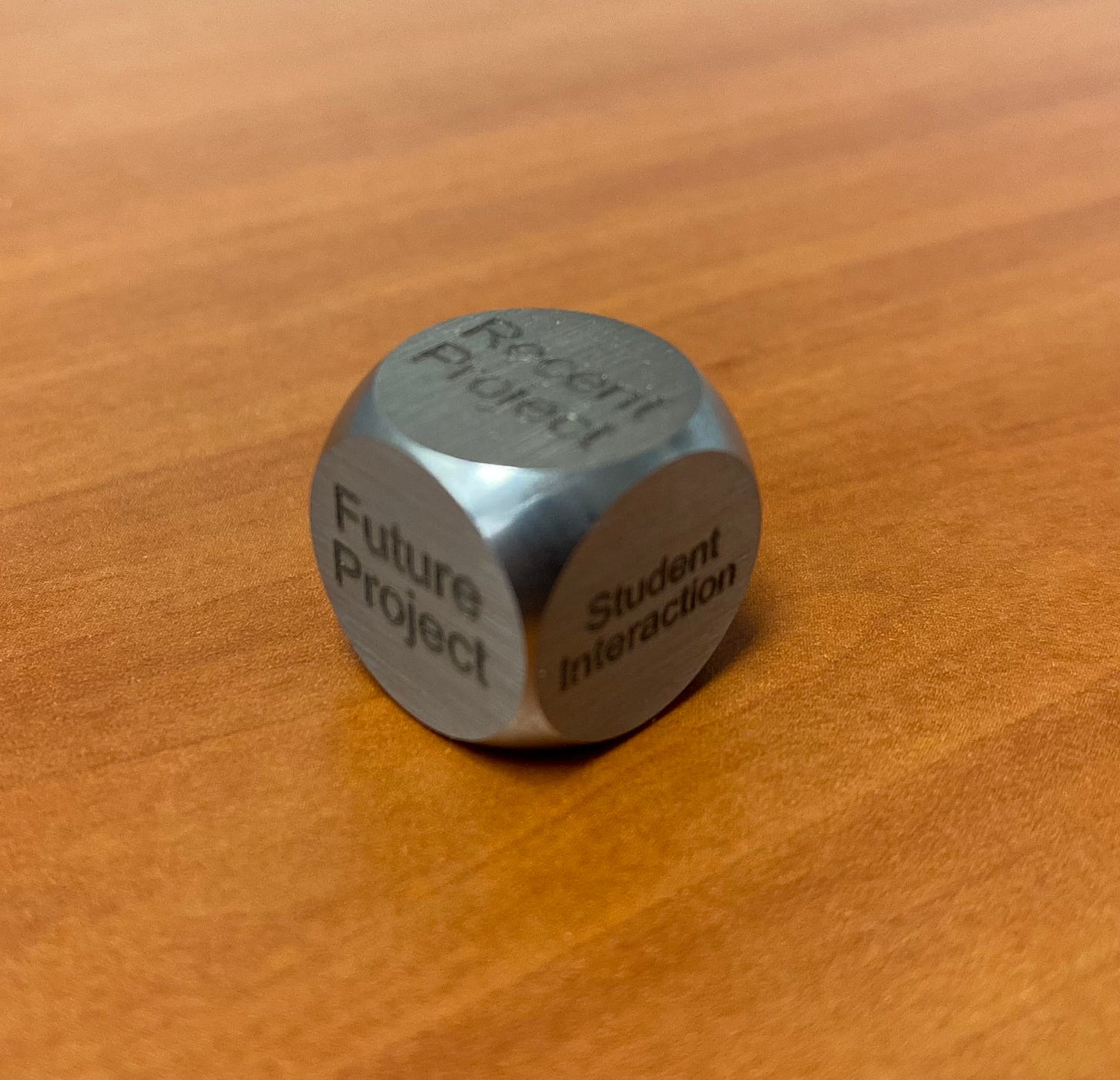Preparing for the Impromptu
On productive small talk
It’s said that the secret to a good impromptu speech is preparation.
This is particularly true in fundraising, where any conversation can give way to a deeper consideration of mission.
Of course, pre-planned meetings are the most common. These are the conversations that are arranged in advance, meeting for coffee to talk about a specific project, for example. We prepare for these ahead of time, thinking about the donor’s past contributions, their proximity to the organization, and their propensity to give. And these should be well-rehearsed.
But perhaps more frequently (and particularly at a school) we fundraisers run into members of the community who breezily ask, “How’s it going?” And, unfortunately, we are often unprepared with an adequate response and so fall flat footed. With a little preparation, however, these impromptu moments could very easily and naturally lead to more focused conversation, or even additional coffee meetings down the road. In other words, they are a missed opportunity.
And no, these excellent people are not necessarily asking how things are going with me and my interests! What they’re really asking is “how are things going at X organization?”
After years of failing to recognize this (and I’m still working at it by the way) I came up with a three point preparation scheme which I regularly reflect on for the purposes of making good conversation at unexpected moments. I even created an office game to involve others → keep reading.
This plan includes having at least one anecdote for each of the following topics:
A recent student interaction.
A recently completed project.
Details on an upcoming project.
So when someone asks, “how’s it going?” I don’t have to search my mind for something the other person might find moderately interesting (football scores, the weather), instead I’m able to quickly share a timely insight into an important aspect of my school.
Each of these points gives something of value to the person that they can then pass on to others in subsequent conversations. You’re helping them to have better small-talk as well! (Side-note: one of the best pieces of advice I learned in graduate school about dealing with the media was to always speak to them assuming that whatever you mentioned would be published unedited on the front page.) If you give someone an interesting bit of info, odds are high that they will share it with others in short order.
To help crowdsource information, I even had a custom die made as part of a game for our fundraising team using these points, which we break out before social events, and even try to use weekly.
I call the game, “HOW’S IT GOING?”
Rules:
Everyone stands in a circle.
Someone volunteers to roll first, then must provide an answer to the topic that appears. After sharing, the next person rolls and the game continues.
Everyone rolls twice.
Note:
Don’t chat about individual topics too much! You’ll find it’s very easy to get distracted by conversation, and someone is sure to exclaim, “I didn’t know that!” Or, “Wow, that’s interesting!”
The game should last no more than 10 minutes (again, avoid chit-chatting as much as possible!).
Have someone email the group the top two responses for each category as a follow-up.
*Nb. This game works best when everyone prepares short responses to each of the three areas in advance of playing.
If four people play, that’s eight potential items for conversation, more than enough to share during three minutes in passing. And because of the collective “surface area” of the group, you’ll be amazed by what things are mentioned which you alone might have overlooked. Someone might also provide a particular angle to the topic which makes it much more interesting or important. And all of these items are highly connected to the recent life of the organization.
This is just one way I’ve approached preparing for the impromptu.
Small talk doesn’t have to be simply about passing time, it can also be an opportunity to deepen connection to mission. As screenwriter Robert McKee wrote in his fantastic book Story, “stories are the currency of human contact.” They are the means by which we enter into meaningful relationships with others and reveal a bit about who we are and what we care about.
As fundraisers, one of our best tools is sharing stories and updates about the place we love. And to use these stories to identify or to help others to dial in on what is most important to them.
“Oh, that sounds interesting, I’d love to hear more about that sometime, let’s grab coffee.”
Great!


